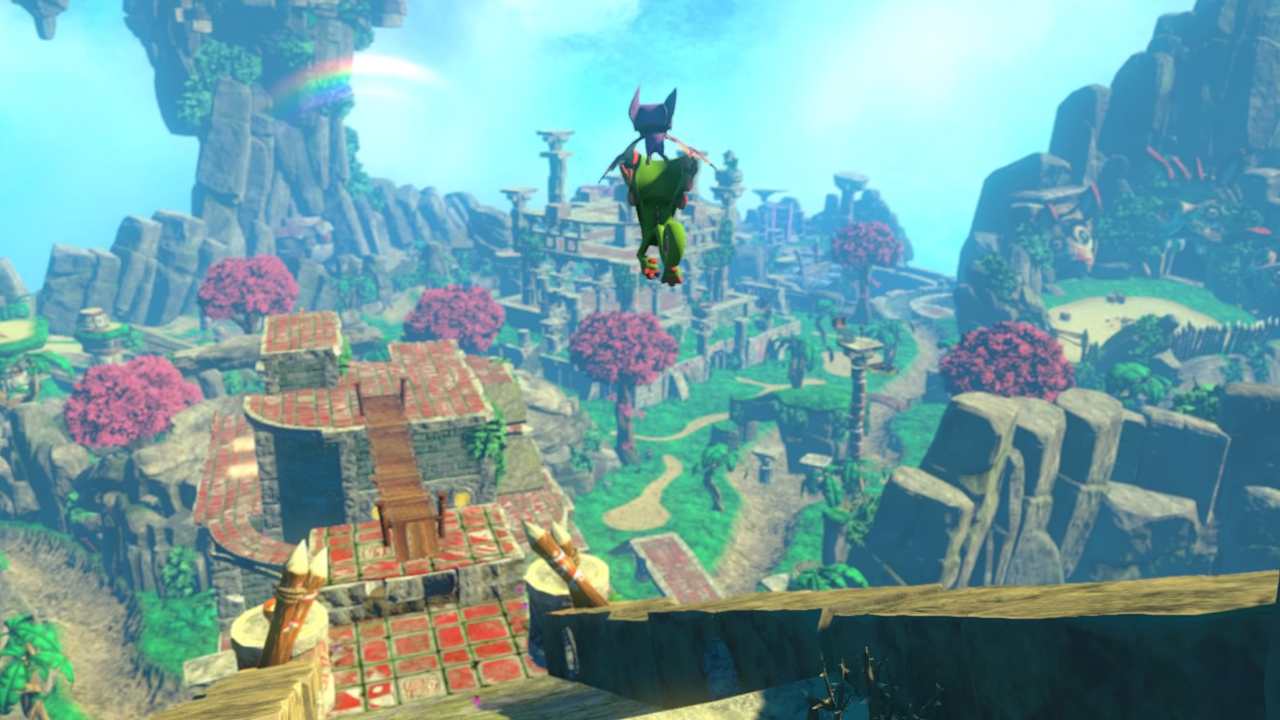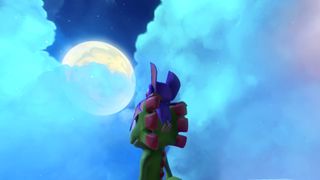12DOVE Verdict
Evoking the essence of late-'90s platforming without significantly modernising it, Yooka-Laylee is a game with noble aspirations, grounded by clumsily flawed execution.
Pros
- +
Beautiful, enticing audio-visual design
- +
Character control feels great
- +
Its best challenges channel exactly why 3D platforming is brilliant
Cons
- -
The camera is obstructive throughout
- -
Too many challenges are forgettable, flawed in execution, or obtuse
- -
Metroid-style ability system is awkwardly delivered
- -
Dated approach to user-friendliness
Why you can trust 12DOVE
Immediate impressions of Yooka-Laylee are pretty damn great. From the very off, it nails the all-important character-feel inherent to the success of any 3D platformer. Our bat/lizard combo protagonist is instantly responsive, and movement is slick, swift, and eminently malleable – the product of well-judged character weight, momentum, and control-precision working in co-operative tandem. And jumping? Well jumping feels just lovely. The same goes for careening into hapless enemies with the harnessed frenzy of the pair’s spin attack. Whizz. Bosh. Pop. It’s as delightfully tactile as any character action in the game, both functional and fun to perform in its own right.
As such, Yooka-Laylee seems to deliver exactly what we were hoping for. A modern game that recreates the sensibilities of its late-‘90s inspirations in a thoroughly polished form that those Nintendo 64 originals simply could not. A game that delivers what our nostalgia-addled minds remember Banjo-Kazooie being, rather than the antiquated reality. In tandem with bold, detailed, characterful audio-visual design, Yooka-Laylee’s first couple of hours feel every bit the platforming equivalent of 2016’s Doom. A game that reaches back into the ‘90s, grabs the core essence of its original series, and yanks it through into the present, updating as it goes to create the sense of being dropped into a parallel universe where that style of game design never fell out of fashion.
It doesn’t last.
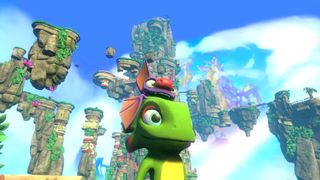
The cracks first start to show, in a tragically fitting case of the wrong kind of period accuracy, with the consistently shonky camera. Long the bane of the genre, the creation of a consistently effective camera system – whether automated or under player control – certainly isn’t an easy task given the ever-changing, omni-directional demands of platforming in a 3D world, but Yooka’s feels at times almost willfully obstructive, prone to stubborn shifts in the wrong direction, particularly (but not exclusively) in tighter areas, and pretty regular, full-blown angle flips at entirely inopportune moments. Of course, stalwarts of the genre are used to wrestling with such problems, but that doesn’t excuse the fact that the camera here is a regular and frequent roadblock to actually playing the game, making some otherwise fun and innocuous challenges a chore, and weaker ones really not worth the effort to finish.
As for those challenges, which make up the meat of the game, they’re decidedly inconsistent. Following the traditional template laid out by Banzo-Kazooie and main-series 3D Mario, Yooka-Laylee’s core objective is the collection of Pagies, anthropomorphised book pages used to unlock new Worlds and expand currently open ones in order to access new, harder challenges, to a total of 25 in each. These require a wide variety of localised platforming, puzzling, and combination feats to attain which, while certainly capable of being fun and rewarding, are also diluted by some uninspired, forgettable, or simply dated design. Again, Yooka-Laylee’s 1998 origins surface in the wrong way, and the cracks widen.
For every breakneck sprint through a gratifying platform assault course, there’s a bland, card-matching memory test or insta-fail, trial-and-error maze built of identical, looping architecture. For every precarious, carefully timed ascent of a hazardous mountain, there’s another stale, repetitive, drastically overlong boss fight, or timed slide section, dull in layout but littered with over-numerous hazards of the cheapest variety.
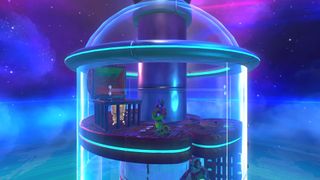
And while later and expanded Worlds tend to become more involved, too many objectives rely on cheesily tight time limits and unnecessary punishments for slight errors, creating a blunt artificial difficulty based on luck, rather than building a nourishing, interesting one out of cleverly escalating design or intricacy. There’s a definite feel of breadth over depth in Yooka-Laylee, the game’s valiant focus on progressively unfolding and revealing its world coming at the expense of the activities within it.
With its Worlds also lacking a carefully crafted sense of flow and pace in their layouts – they’re always beautiful, vibrant environments, but tend to feel like collections of randomly placed stuff rather than real, logical places, making navigation less intuitive than it could be – there’s an increasing sense of the lightweight about the overall experience. And ironically, it’s eventually compounded by the game’s chosen means of expansion.
In addition to its versatile core move-set, Yooka-Laylee furnishes an eclectic set of additional, persistent powers in exchange for Quills, its secondary, more numerous currency. Ranging from grappling hooks, to explosions, to Sonic-style spin-dashes, and ultimately to full-blown flight, these expanded abilities can mostly be purchased in any order, albeit with a couple of stages of progress-based unlocking occurring in the shop. But while they add a great deal of valuable re-exploration scope to the factory-based hub, by way of genuinely fun, Metroid-style backtracking and secret-scouring, their use in the main game Worlds leaves a fair bit to be desired.
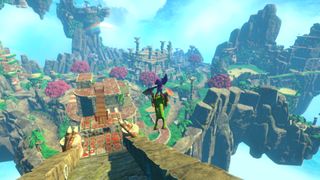
The failings of this ability-gating system ultimately come down to what feels like careless implementation, but the issue starts in Yooka-Laylee’s overall approach to challenge design. In addition to the variable quality of its objectives, the game also has a problem with transparency, its visual cues and systemic signposts not always doing the best job of signifying approaches and solutions, in the more puzzle-based challenges at least. Although sometimes puzzling for the wrong reasons, this stuff can generally be worked out, even if by a brute force, try-everything strategy. But the problem comes when challenges require certain powers, particularly late-game ones.
Without flagging these requirements, or implying them through intuitive design, Yooka-Laylee seems happy to let the player fruitlessly attempt the impossible with no sign that the missing ingredient isn’t a clever solution, but rather a special ability that they may not yet even know exists. At best, this is a poor and time-wasting consideration for the player experience. At worst, it’s an early boss-fight that’s effectively impossible (but not obviously so), until you gain one of two late-game abilities, at which point the entire battle is vetoed and over in seconds.
Coupled with a few distinctly abstract and oblique interpretations of abilities in its puzzle solutions, instances where the game’s previous teachings dictate that certain powers should solve particular problems (but they don’t), and even a World 5 puzzle that abruptly throws in the need for a new, hitherto nonexistent power-up (whose location is consistently masked by the camera’s folly), Yooka-Laylee’s admirable ambitions of a deep, evolving player journey are consistently hampered by confused and counterintuitive execution. That the final flight ability also entirely and immediately breaks a noticeable number of the traversal challenges encountered earlier in the game (and this is a nonlinear game, remember) just epitomises the often messy and careless implementation of the system.
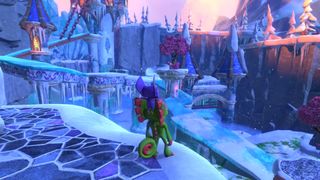
Even the goofy, self-aware personality of the game ultimately suffers from dated awkwardness. Playtonic steers pleasingly into knowing self-parody regarding Rare’s old tropes - even including an enemy type that is literally a set of googly eyes in search of an object to possess - but the charm falls apart as soon as its characters open their mouths.
Flat dialogue, almost devoid of personality, is the default in Yooka-Laylee, a game seemingly desperate to prove how funny it is, but without any discernable personalities or jokes. Yooka himself is maddeningly bland, while Laylee’s endless quest for a sassy edge simply results in her being one of the most witlessly unpleasant game heroes in a long time, seemingly unable to finish a conversation without dropping an unnecessary (and deeply unfunny) insult.
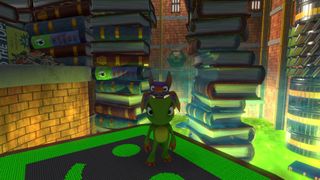
Yooka-Laylee is a frustrating game. And not just when the camera throws you off a cliff, or when your progress is stalled by another tedious, three-strikes-and-out trivia quiz, or when the belligerent checkpoint system respawns you on the opposite side of the map from your current challenge should you dare to die. It’s frustrating because, when you look through the glitches, and the more ill-conceived objective designs, and the intermittent lack of clarity, there is the blueprint for a good game underneath. A bright, brash, breezy, robust and good-natured platformer that, while it might not equal the genre’s greatest, certainly has a place in the conversation.
Unfortunately, by not so much updating 20 year-old design concepts as porting them wholesale into the present - naiveties and technical issues complete - Yooka-Laylee recreates its origins far too accurately. The best of Banjo-Kazooie is here, but so is the worst, with a few new problems to boot. And while a lot of this was much less of an issue in ’98, in 2017 it just makes Yooka-Laylee a whole lot harder to like than you’ll want to.
This game was reviewed on PlayStation 4.
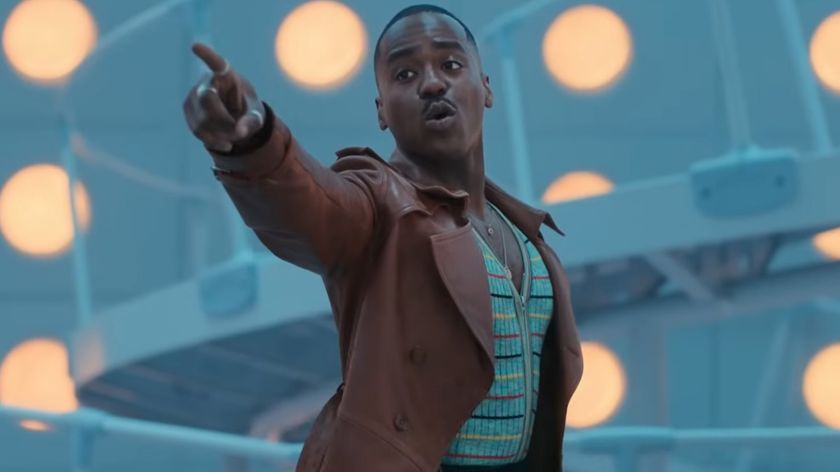
Doctor Who season 2 release date appears to have been announced via an online advert - and it’s sooner than expected

Ms. Marvel actor Iman Vellani got so into Captain America: Civil War that she "lost friends" over "people being Team Cap"
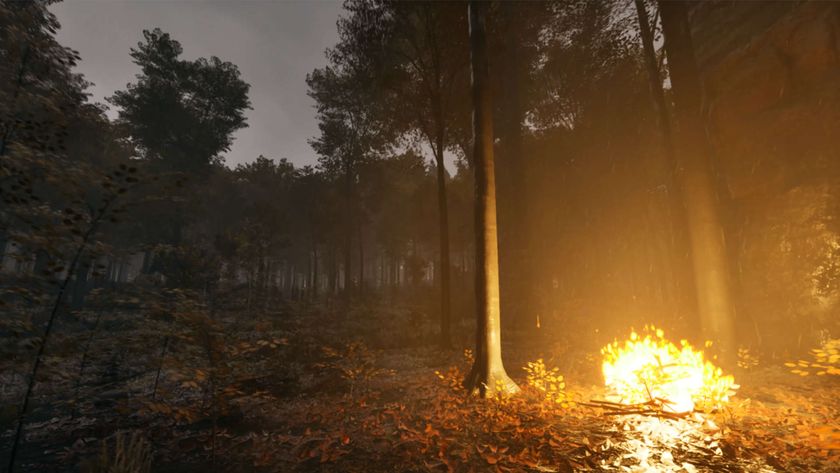
"We try not to say 'fun'": Meet the devs behind the new survival game that puts the "human element" before letting you be a mountain-leveling demigod
Most Popular





